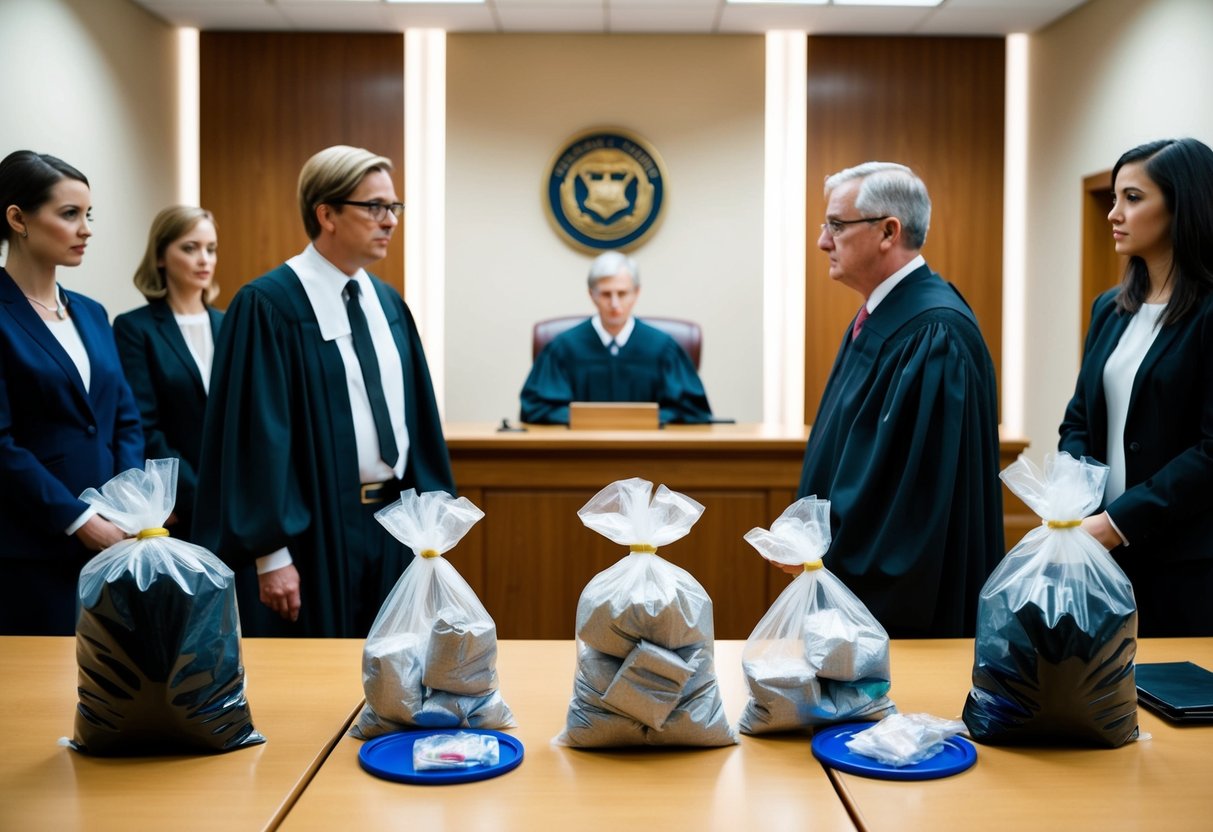Evidence and Trial Proceedings
In drug offense cases, evidence plays a critical role from arrest to sentencing. Proper use of evidence can influence prosecutorial decisions, charge offers, and jury proceedings.
Types and Role of Evidence in Drug Cases
Different types of evidence are used in drug offense cases. Physical evidence includes recovered currency, drugs, and paraphernalia. Audio and video evidence might involve recordings of undercover operations or phone calls. Eyewitness identification by officers or informants is also crucial. Each type of evidence helps build the prosecution’s case and can lead to a guilty plea or conviction.
The Implications of Evidence on Sentencing
The quality and quantity of evidence collected impacts sentencing. Strong evidence such as recorded admissions or video footage can lead to higher sentencing recommendations. Recovered currency and quantities of drugs may influence the severity of charges and the probability of harsher sentences. Our role is to present this evidence clearly to the judge or jury to argue for an appropriate sentence based on the evidence.
Challenges in Eyewitness Identification and Undercover Operations
Eyewitness identification and undercover operations face challenges. Eyewitnesses may make identification errors under stress, which can lead to wrongful convictions. Undercover officers must balance maintaining their cover while gathering usable evidence without violating legal procedures. Cross-examining eyewitnesses and evaluating the conduct of undercover operations is essential for ensuring just outcomes in trials.
Interaction Between Criminal Justice and Substance Abuse
The criminal justice system deals with many cases linked to substance abuse. Key areas include the connection between drug use and crime and the role of treatment programs in correctional settings.
Drug Use, Crime, and Incarceration
Drug use often leads to crime. Many incarcerated individuals are there due to offenses related to controlled substances. These crimes range from possession to distribution. Substance abuse disorders contribute to high prison populations.
Addiction can drive criminal behavior. This leads to repeated offenses and eventually recidivism. Criminal offenders with substance use disorders face a cycle of arrest and imprisonment. Addressing these issues holistically is crucial.
Drug courts offer an alternative. These courts focus on rehabilitation instead of punishment. They provide access to community treatment programs and medications like methadone or buprenorphine. This reduces relapse and crime rates.
Treatment Programs and Rehabilitation in Correctional Settings
Inmates often need help to combat addiction. Rehabilitation programs within prisons aim to provide this support. Treatment programs offer various services. These include counseling, medication, and behavioral therapy.
Medications like naltrexone are used to manage addiction. By treating substance use disorders, we can help reduce recidivism. Corrective measures without treatment often fail to prevent relapse.
Prison-based rehabilitation programs also prepare inmates for re-entry into society. These programs work alongside community treatment programs. This collaboration aims to create a support system post-release. Effective rehabilitation requires continuous support and necessary resources.
Policy and Plea Bargaining in Drug Offense Cases

In drug offense cases, policy and plea bargaining play crucial roles in shaping legal outcomes. These factors influence prosecutors’ strategies and reflect evolving societal attitudes towards drug offenses.
The Role of Prosecutors and Plea Bargaining Strategies
Prosecutors often have significant discretion in drug offense cases. They can decide how to charge a defendant, what plea bargains to offer, and whether to prioritize treatment over punishment. Their strategies may depend on defendants’ detention status, prior prison sentences, and multiple plea offers.
We see a focus on community supervision or addiction treatment in some cases rather than immediate incarceration. This approach aims to address public health crises like heroin and marijuana addiction. Prosecutors might offer reduced sentences in exchange for guilty pleas, thus avoiding lengthy trials.
Evolving Attitudes and Policy Impact on Drug Offenses
Public attitudes towards drug offenses have shifted, impacting policy decisions. Nowadays, there is more awareness of the need for public safety and addiction treatment over strict punishment.
Policies reflect this change by encouraging paths to recovery and employment for offenders rather than solely focusing on incarceration. For instance, NIDA has highlighted the importance of treating addiction as a health issue, not just a criminal one. This evolving perspective affects how we handle cases involving overdoses and minor drug offenses.




